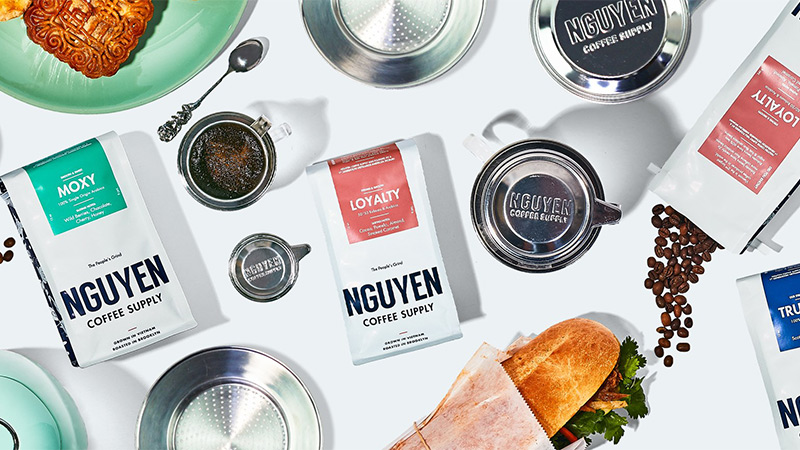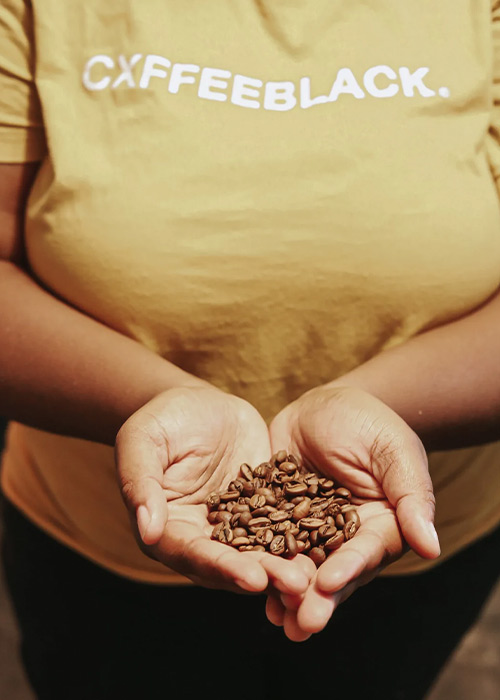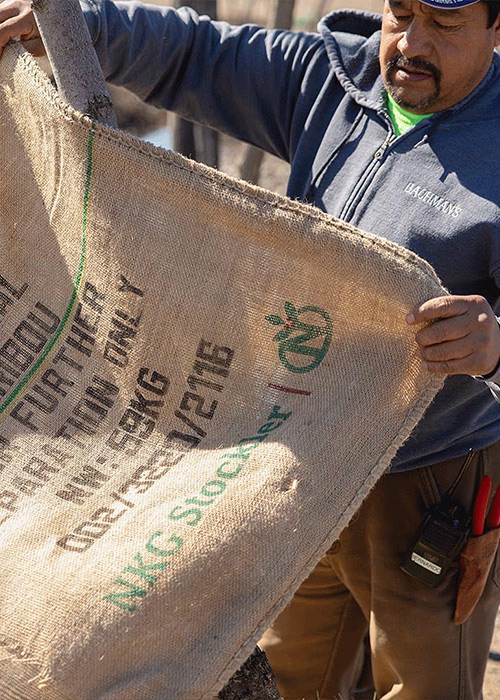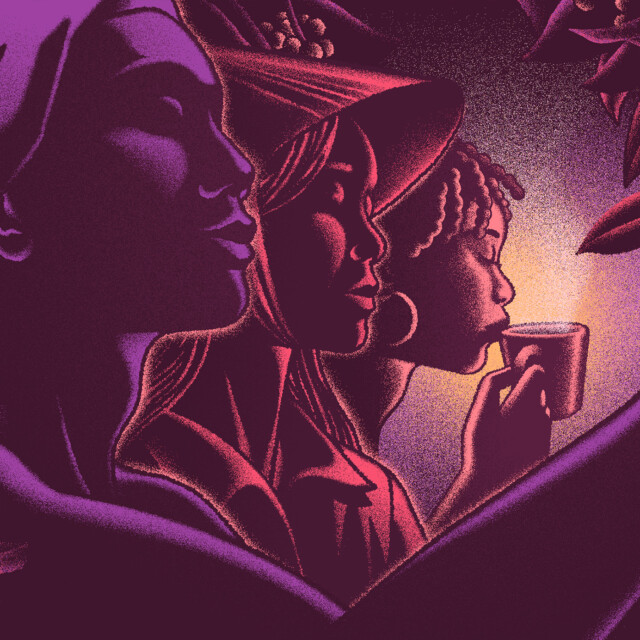Sahra Nguyen’s business is built on the back of a single bean.
Nguyen, a Brooklyn-based documentary filmmaker, had become increasingly disheartened by the lack of Vietnamese coffee available in the United States and especially the malignment of the robusta bean — a resilient coffee species grown in Vietnam that has long been cast aside by the majority of coffee snobs across the country in favor of the more popular arabica variety.
“I started noticing around 2016 that Vietnamese iced coffee had a huge presence in the specialty coffee scene, like chai and matcha tea,” says Nguyen. “But every time I would order the Vietnamese iced coffee, it was never, ever Vietnamese coffee beans — always some Colombian or Ethiopian beans. There was an inconsistency in values.”

Across the country, coffee brands are emerging with their mission statements on their sleeves, whether that be introducing new cultural heritages around coffee, solidifying sustainability efforts, or promoting ethical labor practices. Nguyen Coffee Supply and other brands like it have come to represent a new generation of kaffeeklatsch culture — one built on fellowship, community, and with an effort to extend a legacy — and they’re rapidly popping up in neighborhoods and grocery stores across the States.
As the third most drank beverage in the world after water and tea, coffee easily runs the globe. Vietnam is the second most prolific coffee producer in the world, a fact that left Nguyen puzzled — people were rapidly consuming Vietnamese-style coffee but weren’t willing to accept robusta as a legitimate craft coffee bean. Yet the variety is rapidly making strides in shops across the country, and even the The New York Times predicts that more and more Americans will be consuming the highly caffeinated, less expensive species in the coming year.
“What we are doing at Nguyen Coffee Supply is completely challenging the norm and the stigma that beans exist in superiority — because they don’t,” says Nguyen. “Our work requires education and narrative shifting, but alongside that, we also need to actually put in the work to improve the bean. We need to invest in the coffee bean.”
Narrative and education are also at the heart of cxffeeblack, a brand founded by musician, educator, and entrepreneur Bartholomew Jones in Memphis, Tenn. Jones had spent countless hours working and hanging out at coffee shops, but he had begun to notice some uneasiness when he brought others into his newfound “third space.”
“I noticed whenever I would want to bring some of my friends, generally we were the only Black people — that was a deterrent for a lot of folks,” says Jones. “I started to think, ‘What would a version of coffee look like that was culturally congruent with the Black experience?’”
Jones began looking more into the history and development of coffee and learning more about its origin in Ethopia. “That was the first coffee culture,” he notes, “so why is a Black face so rare within a coffee shop?” He decided he needed to grab the narrative by the horns, starting cxffeeblack as a grassroots project in an effort to reclaim Black coffee culture. While at first he wasn’t able to source his coffee directly and had to partner with a local coffee roaster, Jones eventually set out to build relationships with Ethiopian farmers in Guji Zone to bring their beans directly to the United States. From there, he was able to create his first single-origin coffee, Guji Mane — a reference to rapper Gucci Mane — combining his love for the region and his work in the music studio.

“It was a joke at first, and then we decided let’s just do it as merch and only 50 bags,” says Jones. “It then sold out super fast at a concert, so then we saw that the people like this. I guess we’ll keep trying.”
Ethically sourcing coffee beans can be a difficult feat. It is common for coffee entrepreneurs just starting off to buy green coffee beans from importers, but Nguyen decided she couldn’t go down that road because none of these importers offered single-origin Vietnamese beans — she had to find those herself. “I was actually working on a documentary in Southeast Asia, and I just asked my family members if they knew anybody that had a coffee farm,” says Nguyen. “We traveled to Da Lat and exchanged our values, our vision about coffee, and I learned from [our producer] how he feels about the coffee initiative in Vietnam in the global context. That was our first producing partner and then from there, we started working on the whole exporting process.”
But while maintaining strong relationships with their producers abroad is essential for Jones and Nguyen, there is still hard work to be done stateside in developing and sustaining communities. Especially in light of Starbucks’ less-than-supportive response to rapid unionization, more coffee brands have made efforts to promote fellowships, work-life balance, and mobility for their staffs. For Nguyen, whose coffee is available both online and in retail locations, that means promoting a healthy work-life balance. The founder literally funds her employees relaxation and wellness by bankrolling services such as facials and massages.
A point of pride for cxffeeblack is its Specialist-In-Training (SIT) Internship, currently in its first graduating class and spearheaded by Jones’s wife, Renata Henderson. The internship provides opportunities for students of color to learn more about coffee culture, history, sourcing, and roasting to become competitive job candidates in the industry at large.
“When I was an undergrad, there was always the question of, ‘Why don’t we have any black professors?’ They’d always say, ‘Well, no one’s qualified or nobody wants to apply,’” says Jones. “I know that there are qualified folks. I feel like you’re just not seeking them out. We’re at least providing the first solution which is removing ‘we can’t find educated or trained baristas that are Black.’ Go ahead, remove that excuse.”
While larger coffee enterprises are a bit more tight-lipped on the subject of equity in the workforce, many are eager to promote their initiatives in the community at large. Caribou Coffee, based in Minneapolis, takes pride in the various ways it engages with and supports local communities. According to Kayleen Alexson, director of brand experience, Caribou Coffee donates a considerable amount to initiatives in the Twin Cities at large, but the company is especially proud of what happens when a new store opens. During opening weekends for new franchises, $1 from every beverage purchase is donated to a local non-profit of the manager’s choosing, helping to sustain community connections in each of Caribou’s markets.

“We have a really incredible local coffee scene here in the Twin Cities area, and that especially is something we continue to draw inspiration from — the focus on connection and one-on-one interaction with guests,” says Alexson. “If you’re in a Caribou, you’re in a local coffee shop; it’s that kind of experience.”
While they focus heavily on the communities they serve, the next step for smaller coffee brands is to grow beyond the local level. For Nguyen Coffee Supply, that means focusing on expanding its lineup, having just released a line of canned cold brew this month. At cxffeeblack, production is amping up to meet demand from its already incredibly loyal customer base.
Both founders believe that larger enterprises can learn from the extra steps they have taken to connect with locals. “Coffee needs to be integrated in a way that’s congruent with what’s already happening in the culture,” says Jones. “I really hope that other companies become more curious about their communities in the same way they’re curious about the coffee that they’re selling.”
This story is a part of VP Pro, our free platform and newsletter for drinks industry professionals, covering wine, beer, liquor, and beyond. Sign up for VP Pro now!
